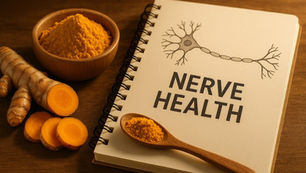top of page
Insights from Nature


Citrus Bergamot and Holy Basil for Antioxidant Wellness
In the modern wellness landscape, oxidative stress, inflammation, and hormonal imbalance are recognized as key contributors to chronic fatigue and metabolic disorders. Two natural ingredients — Citrus Bergamot and Holy Basil (Tulsi) — have emerged as powerful allies in addressing these challenges.
While Citrus Bergamot supplements are known for supporting cholesterol and heart health, Tulsi extract is a revered adaptogen that calms stress responses and enhances cellular prot


Citrus Bergamot and Ginger for Metabolic & Digestive Health
Among natural options, Citrus Bergamot and Ginger stand out for their complementary actions on cholesterol, inflammation, and gut function.
While Citrus Bergamot supplements are valued for their lipid-lowering polyphenols, Ginger root offers well-documented digestive and anti-inflammatory benefits. When used together, they form a botanical pair that supports both cardiovascular and gastrointestinal health in a natural, evidence-based way.


How Citrus Bergamot and Ashwagandha Support Heart & Stress
Modern health challenges often arise from 2 interconnected issues: metabolic imbalance & chronic stress. Nature offers powerful solutions in the form of time-tested botanicals — among them, Citrus & Ashwagandha. These 2 ingredients represent a bridge between Mediterranean & Ayurvedic traditions. Citrus Bergamot supplements support lipid & cholesterol balance, while Ashwagandha helps regulate the body’s stress response. Combined, they promote overall resilience, energy & cardi


Citrus Bergamot Blend with Ayurvedic Herbs for Metabolic Health
Among the most promising natural combinations is the Citrus Bergamot blend — a synergy between Mediterranean citrus polyphenols and five Ayurvedic herbs: Ashwagandha, Ginger, Holy Basil, Turmeric, and Black Pepper. Together, these botanicals create a well-rounded approach that supports cholesterol balance, liver function, stress regulation, and cellular resilience.


Ginkgo and Brahmi: Natural Brain Boosters for Memory, Focus, and Clarity
Ginkgo Biloba and Brahmi (Bacopa monnieri), ancient brain aids, hail from China and India. Ginkgo Brahmi's memory power is trending as Americans sharpen their minds. Key Health Benefits of Ginkgo & Brahmi: Enhances Memory Ginkgo Brahmi memory boosts recall and learning naturally, Supports Brain Health Ginkgo Brahmi brain health protects neurons, Improves Focus Brahmi focus and Ginkgo keep you dialed, Lifts Cognition Ginkgo Brahmi cognitive synergy powers mental clarity and He


Ayurveda: Ancient Healing Wisdom for Modern Holistic Wellness
For more than 5,000 years, Ayurveda has guided how people eat, heal, and live in harmony with nature. This ancient Indian system — whose name means “the science of life” — blends herbal remedies, lifestyle routines, and mind-body balance to prevent disease rather than merely treat it.
Today, Ayurveda is gaining recognition across the United States as more people explore natural approaches to wellness, stress relief, and longevity.


The Importance of Turmeric Purity: How to Identify Authentic Turmeric Powder
Whether you’re buying turmeric for cooking or for health purposes, knowing how to identify pure turmeric powder ensures you get the real curcumin benefits your body deserves.
Pure turmeric powder has a deep golden-yellow color, an earthy aroma, and dissolves evenly in warm water without leaving white residue. Authentic turmeric should list Curcuma longa on the label, test negative for synthetic dyes, and ideally be certified organic or lab-tested for purity.


Turmeric Supplements vs Tea: Which Delivers More Curcumin?
Turmeric can be enjoyed in many ways — stirred into a warm tea, sprinkled into food, or taken as a capsule. But when it comes to getting enough curcumin, the active compound that gives turmeric its golden color and health power, not all forms are equal. This article breaks down how much curcumin you actually get from turmeric supplements versus tea, and how to choose the most effective option. Turmeric supplements deliver far more curcumin than turmeric tea.


Discover the Benefits of Herbal Supplements
When I first started exploring natural health options, herbal supplements caught my attention. They offer a plant-based way to support your body without relying on synthetic chemicals. If you want to boost your wellness naturally, herbal supplements might be the perfect addition to your routine. Let me walk you through the key benefits and how you can make the most of them. Understanding Herbal Supplement Advantages. Herbal supplements come from plants, roots, leaves, flowers


Fresh vs Powdered Turmeric — Which Form Is More Effective?
From golden curries to herbal teas, turmeric adds both color and wellness to everyday life. Fresh turmeric root offers natural essential oils and a milder curcumin concentration, while turmeric powder provides a more potent and stable source of curcuminoids. For most therapeutic uses—like supplements or teas—powdered or standardized turmeric curcumin extracts deliver stronger results, though fresh root shines in cooking and short-term detox support.


Elderberry and Echinacea: The Proven Herbal Duo for Stronger Immune Support
Immune health is a growing priority for many people, especially during seasonal changes and travel. Two popular botanicals often used for this purpose are elderberry and echinacea. You may see them in products such as elderberry syrup, elderberry juice, capsules, supplements, and elderberry and echinacea tea. But what makes them effective, and what does science actually say?


Curcumin 95% vs 97%: What Do the Numbers Really Mean?
When you buy a turmeric supplement, you’ll often see labels that read Curcumin 95% or Curcumin 97%. These numbers might seem small, but they carry important information about purity, potency, and absorption. Let’s break down what they mean, how they affect your health, and whether the extra 2% makes a real difference.
Curcumin 95% and 97% both refer to the standardization level of curcuminoids — the active compounds in turmeric responsible for most of its health benefits.


Is Turmeric Safe for Dogs?
Known for turmeric's powerful anti-inflammatory curcumin, turmeric has been studied extensively in humans, but growing research shows it may also benefit animals, especially dogs with arthritis, allergies, or chronic inflammation. However, not every dose or form of turmeric is appropriate for pets. Let’s explore what science says about turmeric’s safety, potential benefits, and the correct way to use it for your dog’s well-being.


Will Turmeric Help Neuropathy?
Neuropathy affects millions of adults, especially those with diabetes, injuries, or chronic inflammation. Conventional treatments often provide partial relief but can have side effects, leading many to explore natural options like turmeric. Research suggests curcumin, the main active compound in turmeric root, may help protect nerves, reduce inflammation & support pain relief. But how strong is the evidence, & how can turmeric be used safely for nerve health? Let’s look at wh


Will Turmeric Break a Fast?
Intermittent fasting has become one of the most popular wellness practices for improving metabolism, gut health & energy levels. But many people who drink turmeric tea or take turmeric supplements in the morning wonder: Will turmeric break my fast? Turmeric itself does not break a fast when used in small amounts, but the details depend on what form you use & why you’re fasting. Let’s explore how turmeric curcumin interacts with the body during fasting & how to include it safe


Will Turmeric Stain Teeth or Skin?
While turmeric's benefits for inflammation and skin health are well-documented, many people notice that it can temporarily stain teeth, skin, or clothing.
The good news? These stains are harmless, short-lived, and easy to prevent or remove. In fact, when used properly, turmeric may even improve the brightness of your teeth & complexion. Let’s look at what causes these stains, what science says about turmeric’s effects on enamel and skin, & how to use it safely in your dail


Will Turmeric Cause Diarrhea or Constipation?
Turmeric (Curcuma longa) is well known for its anti-inflammatory and antioxidant properties, but many people wonder if it can upset the stomach or change bowel habits. Since turmeric curcumin supports bile production and gut function, it can affect digestion — for better or worse, depending on dosage and how it’s taken.
Let’s look at what the science says about turmeric side effects on digestion and how to enjoy its benefits without discomfort.


Turmeric Side Effects and Interactions Explained
Turmeric is not completely without side effects or interactions. While it is safe for most people when consumed as food or tea, taking concentrated forms can cause mild reactions or interact with certain medications. This comprehensive guide explains the possible side effects, who should use caution, how to minimize risks, and how to use it safely for maximum benefit.


Turmeric and Holy Basil: Adaptogenic Detox Formula
Turmeric is celebrated for its cleansing & anti-inflammatory curcumin, while holy basil is prized as an adaptogen — an herb that helps the body cope with stress & maintain inner balance.
When used together, they form an adaptogenic detox formula: turmeric supports liver cleansing & inflammation control, while holy basil reduces stress hormones & strengthens immune defenses. This synergy supports both physical purification & emotional calm — the perfect balance between detox


Turmeric and Ashwagandha: Stress Relief and Balance
Turmeric (Curcuma longa) and ashwagandha (Withania somnifera) have been used for centuries in Ayurveda to promote physical strength, mental clarity, and emotional well-being. While turmeric is best known for its anti-inflammatory curcumin, ashwagandha is an adaptogen, meaning it helps the body adapt to stress and maintain equilibrium. When combined, these two herbs create a powerful natural formula that supports mood, reduces fatigue, and enhances both mental and physical res


Turmeric and Black Pepper: Why They Work Better Together
Turmeric is one of the world’s most researched herbs — celebrated for its vivid color & anti-inflammatory compound, curcumin. Yet there’s one challenge: on its own, curcumin isn’t absorbed efficiently by the body. Most of it passes through the digestive tract without reaching the bloodstream. That’s where black pepper (Piper nigrum) comes in. Its key compound, piperine, can increase the body’s ability to absorb curcumin by up to 2,000%.


Turmeric and Garlic: Detox and Immunity Blend
Turmeric curcumin and garlic extract strengthen the body’s natural cleansing systems, support liver health, and help defend against everyday oxidative and microbial stress. This article explores how their combined power works, the research behind it, and simple ways to use them safely in turmeric tea, cooking, or turmeric supplements.


Turmeric and Beetroot: Circulation and Energy Support
Turmeric and beetroot have unique compounds that help the body produce and use oxygen more efficiently. Together, they create a scientifically proven synergy that supports heart health, stamina, muscle recovery, and overall energy balance. Whether you enjoy them as a turmeric tea, juice blend, or in turmeric capsules, this duo helps your body feel energized, focused, and strong from the inside out.


Turmeric and Ceylon Cinnamon: Metabolic Harmony
Modern research confirms that both turmeric and cinnamon play important roles in regulating blood sugar, reducing inflammation, and supporting cardiovascular health. When combined, they create what herbalists call metabolic harmony — a natural way to stabilize energy, protect cells, and promote long-term wellness.
bottom of page